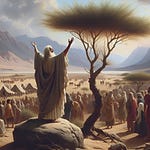Have you ever known someone who was a strong advocate for freedom, yet lived enslaved to some sin? In Exodus 20, God reveals that true freedom is the freedom to do the divine will.
Commentary
The preamble to the decalogue is crucial to understand: “I am the LORD thy God, which have brought thee out of the land of Egypt, out of the house of bondage.” God begins with the grace of redemption before laying down the requirements of His law. The “Ten Words” as the Jews refer to them, are not random rules but a royal charter, revealing the heart of their King in ten commands that are already found from Genesis 1 up to this point. The law for sinners is never a ladder up to God, but that which exposes sin, shows the need for Christ, and reveals God’s will for a people already made alive by grace.
In verses 3–11 we have the first table which directly addresses our love for God. the first commandment orders the object of worship. “Thou shalt have no other gods before me” eliminates justification for any rival. The second commandment orders the manner of worship. God demands worship according to His Word by faith, not sight. The reference to God as “a jealous God” speaks of covenant zeal, not petty envy. His visiting sin to the third and fourth generation highlights the multiplied consequences upon those who reject Him. It is not a reference to generational curses, which is a concept that’s abused and largely misunderstood. The third commandment orders the use of God’s name. To take His name in vain is to lift His Name into lies, oaths, irreverent speech, or false posturing. The fourth commandment orders the use of time: “Remember the sabbath day, to keep it holy.” It calls for a cessation for the purpose of celebration. It is a rest in order to rejoice. It’s not enough that it is obeyed by believers, but insofar as we are able, we give rest to all under our authority. Because it is a creational ordinance and set in the context of the moral law, this command is to be viewed as a binding principle, one day in seven.
In verses 12–17 we have the second table which addresses our love for our neighbor. The fifth commandment orders the structure of relationships. Note, To honor is to treat superiors as weighty, not merely to obey. It is to treat superiors as weighty, and warns that disregard of their authority is a way to shorten your time on earth. The sixth commandment orders the protection of life. The seventh commandment orders the boundaries of sexuality. This guards another creational ordinance, namely, marriage. The eighth commandment orders the stewardship of property, upholding a third creational ordinance—that man is called to labor and enjoy the fruit of that labor without it being unjustly taken from him. The ninth commandment orders the integrity of truth. There is to be no falsehood of any kind, because God is true. And the tenth commandment orders the desires of the heart, showing that God sees beyond our words and actions. No human code puts motives under law like this; but God cares about our very thoughts.
In verses 18–21, the people tremble and beg for a mediator in fear of their life. Moses draws near, typifying how God’s people need the Messiah to fulfill the law and represent them.
Then in verses 22–26, the Lord speaks of an altar made of unfashioned stone, to keep it modest and untainted by man’s works. Steps were forbidden, both to prevent any illusion of heightening the sacrifice to heaven and to avoid immodesty. In v. 24, God says, “I will come unto thee, and I will bless thee” which is a reminder that it is around the sacrifice that God meets with His people.
Application
God requires unrivaled allegiance from all men. Freedom outside of God is self-rule and self-worship. Ask yourself: What do I fear losing? What do I trust to make me safe? What do I love most? The answers to those questions often reveal false gods. Smash them. John exhorted, “Little children, keep yourselves from idols.” But if you can say that God has delivered you from the bondage of sin, then you must put your Redeemer first. Do not carve a convenient Christ of your own imagination, or give your heart to prosperity, position, or any other party. Only when Christ is first are idols dethroned.
Men will eventually discover the weight of their words. The commandments govern our speech regarding God and man. With social media and cellphones removing all friction to 24/7 communication, we need to understand the weight of our words. Since people get paid for words that get attention, instead of God’s Word governing our communication, the market of attention governs communication. Be careful. Refuse exaggeration, follow through on promises, and eliminate that which belittles what is holy. May the Lord touch our lips as with Isaiah’s, so our speech communicate His will and not multiply our sin.
Hell is the only place where there is no Sabbath. It’s hard to fully comprehend how the restating of the Sabbath would have been received by a people who just stepped out of slavery. The Israelites had cried to God because of the bondage that had them working every hour of daylight. God reminds them that from the creation of the world, this is not His will. The Sabbath is a gift to an emancipated people; spiritually and practically. It calls man to rest and rejoice in Christ; both for the blessing of His Creation and Redemption. Exodus 20 roots the day in creation; Deuteronomy 5 pairs it with redemption. The NT doubles down on the redemptive aspect of the Sabbath by placing emphasis on the day that Christ rose from the dead. To neglect this day is the fastest way to erode Christian influence in society and reveals unbelief in God’s provision to meet our needs from the other six days of the week. Parents, set a non-negotiable rhythm in your home around public worship, and put effort in to make this the best day of the week for you and your children. If God is first in this practical way, the other rhythms of life are more likely to fall into place.
The honor of superiors is a test of faith in God’s sovereignty. The fifth commandment bridges the two tables of the law and calls us to treat weighty people as weighty: parents, elders, governors, teachers, etc. While under them, we are obligated to obey up to the point of requesting sin, and we are to do this that our days may be long, i.e. in the interest of self-preservation. Too many parents murmur against institutions and authorities not realizing that their behavior teaches their own children to disdain the authority of God and their home. But do not let an authority pressurize you into sin, and use lawful means to replace unjust authorities with just substitutes.
Christ’s is the means by which the law loses its power to condemn the sinner. After the law is given, the Israelites were inclined to distance themselves from God. At this point, Moses steps in to mediate on their behalf and calm their nerves and establish an altar of sacrifice. This sequence of law, fear, mediator, and sacrifice is the story of redemption. Moses typifies our Lord Jesus, “the mediator of the new covenant” (Hebrews 12:24). At His cross there is no hewn stone, i.e. nothing of the sinner’s effort, and he was lifted up to suffer shame. Young person, have you gone to the Christ of Calvary for pardon? That is where life begins and our trembling over sin and hell ends. He will change your heart so that you will increasingly “keep his commandments” and discover that his commandments are not grievous.
“The sins of a single day, if fully known in all their bearings, would drive us to despair, apart from the infinite grace of God. Apart from the divine plan of justifying the ungodly in Christ Jesus, any one hour would shut us up in hell.” — Charles Spurgeon










